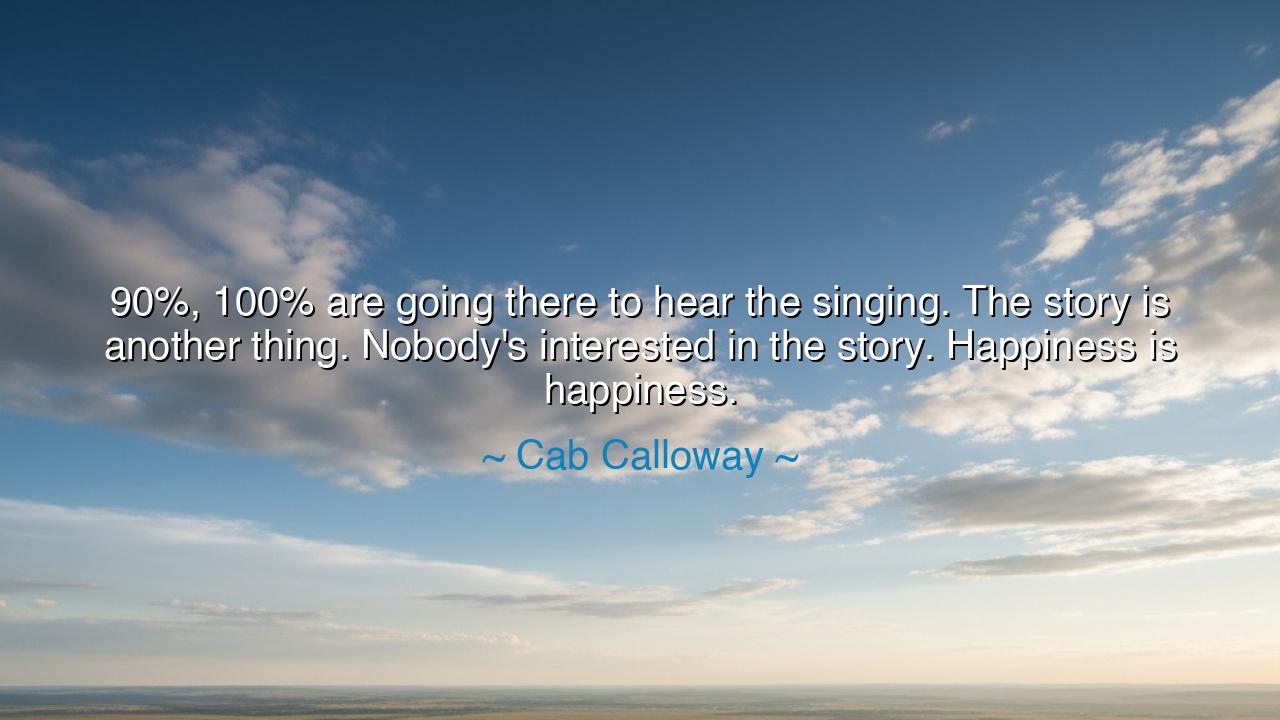
90%, 100% are going there to hear the singing. The story is
90%, 100% are going there to hear the singing. The story is another thing. Nobody's interested in the story. Happiness is happiness.






In the vibrant and unrestrained words of Cab Calloway, that grand master of swing and joy, we find a truth as electric as the music he made: “90%, 100% are going there to hear the singing. The story is another thing. Nobody’s interested in the story. Happiness is happiness.” Beneath the rhythm of his voice lies a deep and timeless wisdom—one that speaks to the nature of art, of joy, and of the human heart itself. Calloway, the showman whose spirit lit up the stages of Harlem’s Cotton Club, knew that what people seek, in the end, is not complexity or intellect alone, but feeling—the raw, immediate pulse of happiness, pure and unadorned.
The origin of these words lies in the golden age of jazz, when the music of Harlem and New Orleans lifted weary souls from the weight of their days. Calloway, standing before his orchestra in a white tuxedo, conducting with the wild grace of a man possessed by rhythm, understood that music’s power is not in the telling of stories, but in the transcendence of them. For when people came to his shows, they did not come to analyze—they came to feel alive. They came for the laughter that bubbled up unbidden, for the swing that made the body forget its burdens, for that moment when sound itself became freedom. He understood, as the ancients did, that the purpose of art is not always to explain, but to elevate.
Yet there is something profound and philosophical in his remark that “happiness is happiness.” It is a statement of simplicity that carries the weight of eternity. He reminds us that joy does not require justification, that its value lies in its being. The world often tries to make happiness a goal to be earned, an outcome of success or understanding. But Calloway’s laughter, his song, his trumpet-like voice—all spoke the opposite truth: happiness needs no reason. It is enough that it exists, that it fills the air like music, fleeting yet unforgettable. It is like sunlight on the skin or a dance that ends too soon—precious because it cannot be held.
The ancients, too, knew this secret. In the symposiums of Greece, where philosophers pondered the meaning of the good life, Aristotle wrote of eudaimonia, the flourishing of the soul. Yet even he admitted that joy often arises in moments that defy reason—in the dance, in the song, in the company of friends. Likewise, in the temples of India, the bhaktas—those who sang their devotion to the divine—did not seek logic but bliss, the ecstasy of losing oneself in the melody of life. Cab Calloway’s words carry this same spirit: the sacredness of joy unbound by story, of happiness that sings for its own sake.
History offers us many examples of those who, like Calloway, gave happiness to others by surrendering themselves to the moment. Think of Louis Armstrong, whose trumpet could make a whole city smile, even when his own heart was heavy. He once said, “If you have to ask what jazz is, you’ll never know.” Both he and Calloway belonged to that divine lineage of artists who knew that truth is felt before it is understood. They did not lecture; they lifted. Their art spoke directly to the human spirit, transcending color, creed, and circumstance. They proved that happiness, when shared through art, becomes an act of communion.
But there is also a lesson in Calloway’s words for those who live in an age of endless noise and distraction. Today, many chase meaning and overlook the simple presence of joy. They analyze the story while forgetting to hear the song. Cab Calloway reminds us that sometimes it is enough to be moved. That laughter, dance, and delight are not frivolous—they are sacred. When we lose ourselves in a moment of pure happiness, we touch something eternal. We taste freedom, not from the world, but within it. In that instant, the mind is quiet, and the heart sings.
So let this teaching ring out like the last note of a jazz solo, long and shining: Do not overthink your happiness. Live it. When joy calls, answer without suspicion. When music plays, dance without explanation. The story can wait—the song cannot. Like Cab Calloway, let your spirit take the stage with courage and abandon. Let your laughter be loud enough to drown out the noise of doubt. For in the end, as he said with that immortal grin, “Happiness is happiness.” And that is truth enough for all time.






AAdministratorAdministrator
Welcome, honored guests. Please leave a comment, we will respond soon